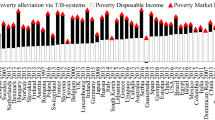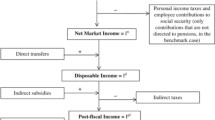Abstract
Fighting poverty is an important concern in most societies. This usually involves transferring resources to the poor. There exists a widespread view that European countries are much more generous to the poor than the United States. We study whether this is really the case. First, we argue that using data on aggregate spending does not allow us to conclude who the final recipients of social expenditure are. We then analyze microeconomic evidence from the Current Population Survey and the European Community Household Panel and find mixed results. In particular, when the concept of relative poverty is used, we find that every individual below the poverty line receives an average transfer in the United States that is 45% higher than in the European Union. When the old are excluded from the sample, this difference is reduced to 14%.
Similar content being viewed by others
References
Adema, W., & Ladaique, M. (2005). Net social expenditure, 2005 edition: more comprehensive measures of social support. OECD Social, Employment and Migration Working Papers No. 29.
Alesina, A., & Glaeser, E. (2004). Fighting poverty in the United States and Europe: a world of difference. London: Oxford University Press.
Alesina, A., Glaeser, E., & Sacerdote, B. (2001). Why doesn’t the United States have a European-style welfare state? Brookings papers on economic activity (pp. 187–278).
Anderson, G., Reinhardt, U., Hussey, P., & Petrosyan, V. (2003). It’s the prices, stupid: why the United States is so different from other countries. Health Affairs, 22(3), 89–105.
Atkinson, A. B., Rainwater, L., & Smeeding, T. M. (1996). Income distribution in OECD countries. Paris: OECD.
Burman, L., Geissler, Ch., & Toder, E. (2008). How big are total individual tax expenditures, and who benefits from them? American Economic Review, 98(2), 79–83.
Congressional Research Service (2004). Green book, committee on ways and means.
DeNavas-Walt, C., Proctor, B., & Mills, R. (2004). Income, poverty, and health insurance coverage in the United States: 2003 (US Census Bureau, Current Population Reports, P60-226). US Government Printing Office. Washington, DC.
Disney, R., & Johnson, P. (2001). Pension systems and retirement incomes across OECD countries. Cheltenham Glos: Edward Elgar.
EPC, Economic Policy Committee (2001). Budgetary challenges posed by ageing populations: the impact of public spending on pensions, health and long-term care for the elderly and possible indicators of the long-term sustainability of public finances. European Commission.
Eurostat (2008). European social statistics: social protection. Expenditures and receipts. Data 1995–2005.
Feldstein, M. (1998). Income inequality and poverty. NBER Working Paper 6770.
Feldstein, M. (2005). Rethinking social insurance. American Economic Review, 95(1), 1–24.
Garfinkel, I., Rainwater, L., & Smeeding, T. (2006). A re-examination of welfare states and inequality in rich nations: how in-kind transfers and indirect taxes change the story. Journal of Policy Analysis and Management, 25(4), 897–919.
Heady, C., Mitrakos, T., & Tsakloglou, P. (2001). The distributional impact of social transfers in the EU: evidence from the ECHP. Fiscal Studies, 22, 547–565.
Hoynes, H. W., Page, M. E., & Stevens, A. H. (2006). Poverty in America: trends and explanations. Journal of Economic Perspectives, 20(1), 47–68.
Jäntti, M., & Danziger, S. (2000). Income poverty in advanced countries. In A. B. Atkinson & F. Bourguignon (Eds.), Handbook of income distribution (pp. 309–378). Amsterdam: Elsevier, Chap. 6.
Moffit, R. A. (2003). Means-tested transfer programs in the United States. Chicago: University of Chicago Press.
OECD (2006). OECD health data 2006.
OECD (2007). Social expenditure database. www.oecd.org/els/social/expenditure.
Oliveira Martins, J., de la Maisonneuve, Ch., & Bjørnerud, S. (2006). Projecting OECD health and long-term care expenditures: what are the main drivers? OECD Economics Department Working Paper 477.
Page, B. (1983). Who gets what from government. Berkeley: University of California Press.
Pellikaan, F., & Westerhout, E. (2005). Alternative scenarios for health, life expectancy and social expenditure: the influence of living longer in better health on health care and pension expenditures and government finances in the EU. European Network of Economic Policy Research Institutes (ENEPRI) Research Report No. 8.
Peterson, Ch., & Burton, R. (2008). The US health care spending: comparison with other OECD countries. New York: Nova Science Publishers.
Sheils, J., & Haught, R. (2004). The cost of tax-exempt health benefits in 2004. Health Affairs, Data Watch, W4, 106–112.
Smeeding, T. L. (2006). Poor people in rich countries: the United States in comparative perspective. Journal of Economic Perspectives, 20(1), 69–90.
Smeeding, T., Rainwater, L., & Burtless, G. (2002). United States poverty in a cross-national context. In S. Danziger & H. Haveman (Eds.), Understanding poverty (pp. 162–189). New York/Cambridge: Russell Sage Foundation/Harvard University Press, Chap. 5.
Whitehouse, E. (2003). The value of pension entitlements: a model of nine. OECD countries. OECD Social, Employment, and Migration Working Papers 9, OECD.
Woolhandler, S., & Himmelstein, D. (2002). Paying for national health insurance-and not getting it. Health Affairs, 21(4), 88–98.
Author information
Authors and Affiliations
Corresponding author
Rights and permissions
About this article
Cite this article
Collado, M.D., Iturbe-Ormaetxe, I. Public transfers to the poor: is Europe really much more generous than the United States?. Int Tax Public Finance 17, 662–685 (2010). https://doi.org/10.1007/s10797-010-9143-y
Published:
Issue Date:
DOI: https://doi.org/10.1007/s10797-010-9143-y




